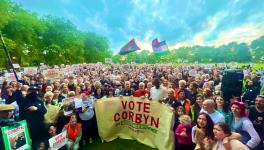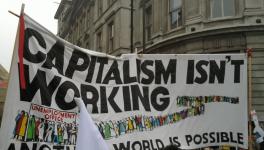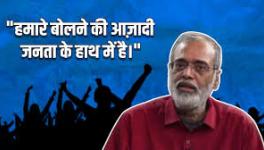Jeremy Corbyn Shows that Left Can Win
Jeremy Corbyn has turned around the electoral prospects of the Labour Party which has been in a free fall since Tony Blair dragged UK into the Iraq War days. In the recently concluded UK Elections Labour saw a 10% swing in its favour – the greatest such swing since Clement Attlee led Labour to victory in 1945. While Theresa May was expecting a big margin in the victory, they have been forced to form government in coalition.
Rough Transcript:
Prabir Purkayastha: Hello and welcome to Newsclick. Today we have with us, D. Raghunandan and we’re going to discuss the UK elections.
This has been a very strange election because, after all, Theresa May had a majority, and she would have run for another three years with this government. Her whole idea was that she will get a bigger majority. That has not happened. So do you think that she is going to pay the price for this?
D. Raghunandan: Well, this morning it was beginning to look as if she would. Although now the Conservative Party seems to have come around to saying let’s go with what they see as a lesser of two evils. And rather than rock the boat again and have another election inside the Conservative Party to decide who is going to lead it and have a further division inside the Conservative Party which will just add more chaos, I think they’ve decided to go with a bad bargain, continue with Theresa May until the elections is over. But what this means basically, I think, is that there’s no chance now of Theresa May leading the Conservative Party at the next elections.
PP: Or even more than 6 months possibly.
DR: Possibly.
PP: But leaving that aside, this election has been a rude shock to the Conservatives who are, initially they had a, something like a 20% lead, you’re talking about a 100 plus majority over the Labour Party, and a huge commanding lead in the Parliament is only reason for being able to negotiate Brexit better. Now, you’re going to get a weak government, you’re going to get a government which is really hanging on by its teeth by virtue of a coalition with the Ulster Unionist, not exactly the best of people to have with you, and with this now, the whole argument for Brexit being negotiated more strongly is gone.
DR: She is in a weaker position vis-à-vis Europe, she does not have the stronger mandate that she was demanding, she has a weaker mandate at home, and whatever she negotiates with Europe now, she is in a weaker position domestically to implement those policies, because clearly the domestic mandate is for less austerity, more public spending, goes against the basic Conservative ideas as well as the lines along which the Conservatives were thinking of negotiating with the Europeans. The second thing, I think, is that this puts paid to the idea of a hard Brexit. The Conservatives will now have their arms twisted in a different direction. They cannot go the way Theresa May was arguing for, because they will be in a weaker position both vis-à-vis Europe and domestically. I think the biggest miscalculation was, as you rightly said, having a majority already in place, but looking for a much bigger majority, playing on what the opinion poll said was an extremely weak Labour opposition and thinking to capitalise on that. But now having gone into the election, finding out that she has handed Labour, and Jeremy Corbyn in particular, a great brand image, which they didn’t have before these elections.
PP: That brings up the most important, really the most important result for Labour. Jeremy Corbyn has really strengthened his position enormously vis-à-vis all those who’re attacking him. He came in on the back of a Labour majority within the party of younger people, people who had come in to rejuvenate Labour as it were, were resisted tooth and nail by the parliamentary party and what would be called the Labour establishment at that point of time, what people are saying the Blairites. He has effectively demolished them in this election, and has really brought out that labour has to shift back to the Left, it has to get an electoral base. And he’s been able to attract a huge amount of support from essentially the youth.
DR: There are just two points I’d like to mention on this. One is, certainly, Corbyn has confounded his critics, his critics on the Labour Right, his critics in the media, his critics among the political pundits, all of whom had written off Jeremy Corbyn, had described him as the weakest leader Labour had ever had, and of being the biggest obstacle to Labour re-emerging in the mainstream of British politics. And he has shown all these arguments to be wrong, that he has in fact been able to rejuvenate the Labour party, which the Blairites were not able to do. He’s brought the youth back to Labour. I think this has been because Jeremy Corbyn forced a repositioning of the central debate of this election. Theresa May wanted this election to be about how do we exit from the European Union. Jeremy Corbyn transformed this from that debate of what kind of Brexit will we have to what kind of Britain will we have. And the debate, therefore, changed to what kind of domestic policies do we have, what happens to social service, what happens to public spending, and he refocused issues on this, and the British public has veered around to his point of view. And, particularly, if you look closer at the results, a large section of the working class, which had shown signs of drifting towards UKIP, has come back.
PP: The other part is the Scottish National Party seems to have fared relatively badly. They’ve lost both to Conservatives and to Labour. What do you think this indicates?
DR: As far as the SNP is concerned, I think the Scottish electorate, this is true of the British electorate as a whole, has been quite tired of having elections forced on them. And the Scottish electorate was even more scared that a very strong mandate for the SNP would mean another referendum in Scotland. I think this is partly the reason for the Scots not wanting an extremely strong presence.
But, on a more serious note, I think the results that we saw, which gave the SNP virtually a 100% of the seats in Scotland the last time around, were also freakish. I think one should accept that they were freak results, and one should not compare the present election results using that as a baseline.
PP: Coming to the other issue that you talked about, Corbyn and Labour, essentially Corbyn was being challenged inside the Labour Party, and as you know, Corbyn was always the outsider, supported peace, supported all forces against armed intervention, supported the Palestine liberation struggle, supported that, you know, we should end occupation of Israel. All of these issues now is, what was unthinkable for the British political centre as it were, Corbyn has been a part of that. Do you think that this would also mean a relook for British foreign policy, particularly with respect to military adventures in West Asia?
DR: It may, it may not. And the reason I’m saying it may not is because, I think Jeremy Corbyn has done a tremendous job at these elections in restoring the centrality of the Left to Labour politics, and prevented Labour from shifting further to the Right. They have got 262 seats in Parliament now, which I think was inconceivable just a few months ago. But 262 are still not 326. And there are many even within the Labour Left who concede today that in order to get back into a winning proposition, Jeremy Corbyn will also have to embrace sections of the Blairite Labour in order to cross that threshold which, at the moment at least, he seems to have difficulty in being able to. Maybe time will tell, and maybe he will be able to engineer a movement further to the Left.
PP: But, after the attacks in Manchester and also London, he’s the only politician who stood up and said this is because of what we have done ourselves in Libya, this what we have done in West Asia, and also focussing on reduction of health services means that you could not handle emergencies, reducing policemen you could not really monitor the people you needed to. So his attack on what happened, particularly on Theresa May who was home secretary during all of this period, was also very different from a mainstream politician in England, who generally have always sided, said let’s all close ranks, these are very bad people from outside who are doing all this, we had nothing to do with it. And the first-time recognition that the UK was responsible for what happened in Libya and also part of the blowback, however reprehensible the bombing in Manchester or London bridge attack was. Point is there is also a complicity of having fostered this. Jeremy Corbyn is the only leading UK politician ever to have said this.
DR: Absolutely right. And Jeremy Corbyn has been the only politician to have said this, maintaining his own record of being the longest lasting outsider in British politics.
PP: In fact, the Labour had shifted away from its position and seems to have come back partially to the position that Labour occupied for a long time, at least in the 40s and 50s.
Just on the last note. You remember Jeremy Corbyn was in India for the Social Forum in which both you and I were involved. And his speech is not very different from what he is saying today. So Jeremy remains where he was, it’s really the British politics which seemed now to have partially come back to him. Would you accept this as a genuine assessment of what has happened?
DR: Yes, I think so. I think Jeremy Corbyn has re-established the positions that the Left of the Labour Party used to take. The point that you made, I think, is right. People have overestimated the tendencies in European politics of what was perceived to be a shift to the Right. They were really a movement of frustration of the people, and if the Right were voicing some of those concerns, then they shifted to the Right. But if there was a strong voice on the Left, then I think we would see the people moving back.
PP: It’s the discontent of globalisation being tapped by the Right in absence of the Left, and Jeremy Corbyn has shown that it is possible. Thank you very much Raghu for being with us. It is all the time we have today, for this episode. Keep watching Newsclick for further episodes, and also watch us on YouTube.
Disclaimer: Please note that transcripts for Newsclick are typed from a recording of the program. Newsclick cannot guarantee their complete accuracy.
Get the latest reports & analysis with people's perspective on Protests, movements & deep analytical videos, discussions of the current affairs in your Telegram app. Subscribe to NewsClick's Telegram channel & get Real-Time updates on stories, as they get published on our website.
























